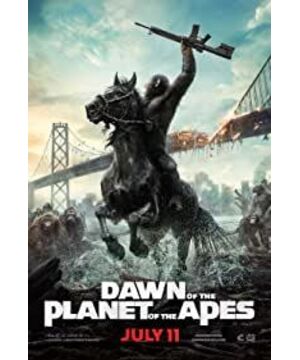But if I really want to talk about which film series are the best in this decade, I will choose "Batman" and "Rise of the Planet of the Apes". Although they are still the products of some classic cultural symbols, they made twenty films that belong to us. A first-century novelty. Among them, the "Rise of the Planet of the Apes" series still has the same epochal significance as the old "Planet of the Apes". The first "Rise of the Planet of the Apes", as a prophetic film, ponders the relationship between humans and animals, and foreshadows some violations of humanity The science of socialism is digging its own grave for human existence. Just last year, Japanese scientists developed a virus without any antidote, which caused great panic in international public opinion. This shows that what happens in the movie can be played out all around us. This sequel, however, extends the film's theme even further, offering thought-provoking reflections on the similarities between animals and humans - they are equally greedy and equally ambitious.
The film begins with the eyes of Caesar, the leader of the orangutan society. Under his governance, the society is like a primitive tribe, peaceful and orderly. Although there are many relics of human habitation in the settlement, now only a ruin is left. Orangutans also believe that humans are long gone. If humans reappear, militants like Koba also hope to exterminate humans and settle their old accounts.
Human society has entered the end of the world because of the gorilla virus. Humans live in castles in the air, and they have encountered an unprecedented energy crisis. They need to go to the jungle where the orangutans live, where there is a hydroelectric power station up the river, where their only hope is. But people are very afraid of orangutans, and at the same time have the domineering attitude of humans as advanced animals. But it is this thing that humans must do, which intensifies the contradiction between humans and gorillas, and further divides the gorilla society. The contradiction within the gorilla has also become one of the main contradictions in the setting of this film. The gradual escalation of these contradictions makes the film full of tension.
Judging from the plot of the film, it draws on the essence of George Orwell, then Koba's coup and rule, more like a farm run by a dictatorship of pigs in Animal Farm. I remember that in the animal farm, there is a very important three chapters of the contract, that is, animals cannot kill other animals, but the pig named Napoleon still bloodily suppressed those revolting animals in the farm. This movie can see the shadow of many animal farms, including the most important rule that the orangutan cannot kill his own kind, but in the end, Koba, under the expansion of his power ambitions, directly broke this rule, killed and arrested alien. Of course, the theme of the film seems more like revealing an inevitable law of history. The Koba here is like Qi in ancient China, who obtained the throne through direct usurpation. If this movie is really a movie about the history of the ape society, what we may see is the historical process of the ape society changing from a primitive society to a slave society.
But the protagonist of this movie is still the orangutan named Caesar. First of all, we see a leader with a high sense of responsibility. He does not want his own kind to be injured in the war, and puts his wife and children first in his heart. bit. In addition, what we see is a leader who has the ability to distinguish between right and wrong. He originally trusted his own kind because he believed that orangutans were better than humans, but this coup made Caesar understand that in fact, orangutans and people have the same goal in different ways, and it is possible for the party to fight against differences. It's something every intelligent creature does. Finally, in the face of the biggest dividing force in the orangutan group, he still dragged his wounded body and fought stubbornly with betrayer like Koba. With his determination and courage, we saw a great, ambitious A vigorous, peaceful political leader. However, his ending was a little tragic. Even if he hoped that his group would be peaceful and stable, the orangutans had already started a war. However, he is not afraid of the next war, and the film ends with the same camera position as the first shot of the film, still with such glaring eyes and calmness.
In terms of visual effects, although the problem of Weird Valley still exists, and although the effect of 3D real shooting is also embarrassing, this is undoubtedly a dazzling performance of motion capture technology. First of all, here is the conversation of each orangutan. In addition, the number of orangutans is huge, and many times they are in high-speed movement. It is also very complicated to accurately match the computer animation to the performance. In addition, for some characters without motion capture data, such as the little monkey and the big bear, how to make them realistic depends on the craftsmanship of the CG artist. But fortunately, there is Andy Serkis's domineering performance in the performance, which allows us to witness the first performance skills with the strength of Oscar winning this year.
In short, it's rare for a sequel to surpass its predecessor. "The Terminator" did it, "Batman" did it, and judging from the current word of mouth, "Rise of the Planet of the Apes 2" also accomplished this feat. It's a sequel that's sensually majestic and at the same time thought-provoking, something that's hard to come by in Hollywood today.
View more about Dawn of the Planet of the Apes reviews










